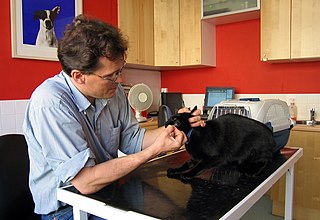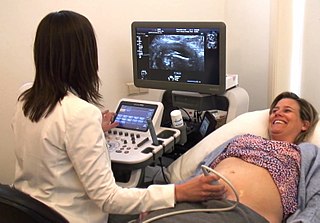Related Research Articles

A registered nurse (RN) is a nurse who has graduated or successfully passed a nursing program from a recognized nursing school and met the requirements outlined by a country, state, province or similar government-authorized licensing body to obtain a nursing license. An RN's scope of practice is determined by legislation, and is regulated by a professional body or council.
The Bachelor of Science in Nursing also known in some countries as a Bachelor of Nursing (BN) or Bachelor of Science (BS) with a Major in Nursing is an academic degree in the science and principles of nursing, granted by an accredited tertiary education provider. The course of study is typically three or four years. The difference in degree designation may relate to the amount of basic science courses required as part of the degree, with BScN and BSN degree curriculums requiring completion of more courses on math and natural sciences that are more typical of BSc degrees and BN curriculums more focused on nursing theory, nursing process, and teaching versions of general science topics that are adapted to be more specific and relevant to nursing practice. Nursing school students are generally required to take courses in social and behavioral sciences and liberal arts, including nutrition, anatomy, chemistry, mathematics, and English. In addition to those courses, experience in physical and social sciences, communication, leadership, and critical thinking is required for a bachelor's degree. BSN programs typically last 2–4 years. Someone who holds a BSN can work in private or public medical and surgical hospitals, physician's offices, home health care services, and nursing facilities. Having a BSN can result in more opportunities and better salary than just an associate degree.

The Nursing and Midwifery Council (NMC) is the regulator for nursing and midwifery professions in the UK. The NMC maintains a register of all nurses, midwives and specialist community public health nurses and nursing associates eligible to practise within the UK. It sets and reviews standards for their education, training, conduct and performance. The NMC also investigates allegations of impaired fitness to practise.
Nurse education consists of the theoretical and practical training provided to nurses with the purpose to prepare them for their duties as nursing care professionals. This education is provided to student nurses by experienced nurses and other medical professionals who have qualified or experienced for educational tasks, traditionally in a type of professional school known as a nursing school of college of nursing. Most countries offer nurse education courses that can be relevant to general nursing or to specialized areas including mental health nursing, pediatric nursing, and post-operative nursing. Nurse education also provides post-qualification courses in specialist subjects within nursing.
A Master of Science in Nursing (MSN) is an advanced-level postgraduate degree for registered nurses and is considered an entry-level degree for nurse educators and managers. The degree may also prepare a nurse to seek a career as a nurse administrator, health policy expert, or clinical nurse leader. The MSN may be used as a prerequisite for doctorate-level nursing education and is the minimum degree required to become an advanced practice registered nurse such as a nurse practitioner, clinical nurse specialist, nurse anesthetist, or nurse midwife.
An Associate of Science in Nursing (ASN) is a tertiary education nursing degree which typically takes 2–3 years to complete. In the United States, this type of degree is usually awarded by community colleges or similar nursing schools. Some four-year colleges also offer this degree. Students awarded an Associate of Science in Nursing are qualified to sit for the NCLEX-RN and apply for licensure as a Registered Nurse.

Veterinary education is the tertiary education of veterinarians. To become a veterinarian, one must first complete a degree in veterinary medicine Doctor of Veterinary Medicine.

Nursing in Australia is a healthcare profession. Nurses and midwives form the majority (54%) of Australian health care professionals. Nurses are either registered or enrolled. Registered nurses have broader and deeper education than enrolled nurses. Nurse practitioners complete a yet higher qualification. Nurses are not limited to working in hospitals, instead working in a variety of settings. Australian nurses are in demand as traveling nurses, particularly those with advanced qualifications.
Professional social workers are generally considered those who hold a professional degree in social work. In a number of countries and jurisdictions, registration or licensure of people working as social workers is required and there are mandated qualifications. In other places, the professional association sets academic and experiential requirements for admission to membership.
A registered dental nurse (RDN) in the United Kingdom works as part of a dental team in a variety of clinical and non-clinical settings.

Nursing is a health care profession that "integrates the art and science of caring and focuses on the protection, promotion, and optimization of health and human functioning; prevention of illness and injury; facilitation of healing; and alleviation of suffering through compassionate presence". Nurses practice in many specialties with varying levels of certification and responsibility. Nurses comprise the largest component of most healthcare environments. Shortages of qualified nurses are found in many countries.
Nursing in Germany is provided by different levels of professional and specialized practitioners. German-registered nurses are called Gesundheits- und Krankenpfleger. Previously, the official name for a nurse practicing in Germany was Krankenschwester (female) and Krankenpfleger (male).
Nursing in Kenya began in 1908 and was conducted without a formal framework until 1950. Over the decades, with demand for healthcare providers increasing due to marked growth in the population of Kenya, training programs were implemented.

A paraveterinary worker is a professional of veterinary medicine who performs procedures autonomously or semi-autonomously, as part of a veterinary assistance system. The job role varies throughout the world, and common titles include veterinary nurse, veterinary technician, and veterinary assistant, and variants with the prefix of "animal health".
The role of veterinary nurses in Australia is to assist the veterinary surgeons in their duties, and to perform animal health-care activities to provide care for their patients.
Veterinary nurses in New Zealand are represented by the New Zealand Veterinary Nursing Association (NZVNA). Veterinary nurses are professionals in their own right, and as such, not deemed a paraprofessional. Veterinary nursing assistants are paraprofessionals, working alongside veterinary nurses in animal health and welfare.

Veterinary medicine in the United Kingdom is the performance of veterinary medicine by licensed professionals. It is strictly regulated by the statute law, notably the Veterinary Surgeons Act 1966. Veterinary medicine is led by veterinary physicians, termed "veterinary surgeons", normally referred to as "vets".

Veterinary medicine in the United States is the performance of veterinary medicine in the United States, normally performed by licensed medical professionals, and subject to provisions of statute law which vary by state. Veterinary medicine is normally led by veterinary physicians, termed veterinarians or vets, but also by paraveterinary workers, such as veterinary technicians, and veterinary assistants. This can be augmented by other paraprofessionals with specific specialties, such as animal physiotherapy or dentistry, and species-relevant roles such as farriers.

A midwife is a health professional who cares for mothers and newborns around childbirth, a specialization known as midwifery.
The New Zealand Veterinary Nursing Association (NZVNA) is the representative body for veterinary nurses in New Zealand. Its purpose is to promote high standards of veterinary nursing in New Zealand.
References
- 1 2 Bassert, Joanna M.; Samples, Oreta; Beal, Angela, eds. (2017). McCurnin's Clinical Textbook for Veterinary Technicians (9th ed.). Elsevier Health Sciences. p. 1374. ISBN 9780323496407.
- ↑ Self, Georgina (May 2013). "RVN profile: Melanie O'Donoghue" (PDF). Veterinary Ireland Journal. 3 (5): 236–238. Retrieved 2018-01-14.
- 1 2 "Milestone celebrated". Veterinary Practice. 5m Enterprises Inc. 1 August 2011. Retrieved 2018-01-13.
- 1 2 Harvey, Laura; Ladyman, Rebecca; Farnworth, Mark (2 November 2014). "International differences in the journey toward compulsory veterinary nurse registration". The Veterinary Nurse. 5 (9): 538–542. doi:10.12968/vetn.2014.5.9.538. hdl: 10652/3130 .
- ↑ McDonnell, Lorraine (August 2016). "Veterinary Nursing Survey" (PDF). Veterinary Ireland Journal. 6 (8): 423–424.